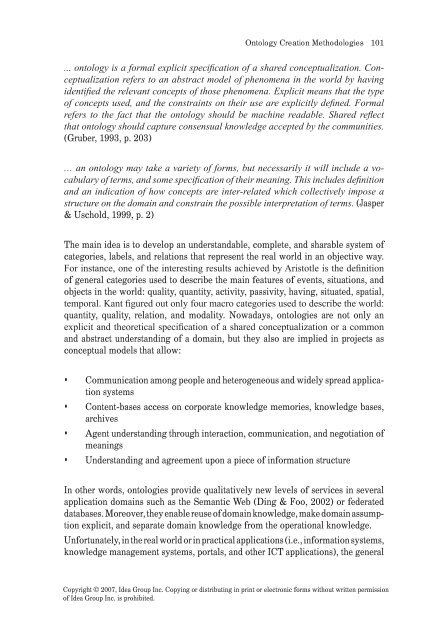Semantic Web-Based Information Systems: State-of-the-Art ...
Semantic Web-Based Information Systems: State-of-the-Art ...
Semantic Web-Based Information Systems: State-of-the-Art ...
Create successful ePaper yourself
Turn your PDF publications into a flip-book with our unique Google optimized e-Paper software.
Ontology Creat on Methodolog es 0<br />
... ontology is a formal explicit specification <strong>of</strong> a shared conceptualization. Conceptualization<br />
refers to an abstract model <strong>of</strong> phenomena in <strong>the</strong> world by having<br />
identified <strong>the</strong> relevant concepts <strong>of</strong> those phenomena. Explicit means that <strong>the</strong> type<br />
<strong>of</strong> concepts used, and <strong>the</strong> constraints on <strong>the</strong>ir use are explicitly defined. Formal<br />
refers to <strong>the</strong> fact that <strong>the</strong> ontology should be machine readable. Shared reflect<br />
that ontology should capture consensual knowledge accepted by <strong>the</strong> communities.<br />
(Gruber, 1993, p. 203)<br />
… an ontology may take a variety <strong>of</strong> forms, but necessarily it will include a vocabulary<br />
<strong>of</strong> terms, and some specification <strong>of</strong> <strong>the</strong>ir meaning. This includes definition<br />
and an indication <strong>of</strong> how concepts are inter-related which collectively impose a<br />
structure on <strong>the</strong> domain and constrain <strong>the</strong> possible interpretation <strong>of</strong> terms. (Jasper<br />
& Uschold, 1999, p. 2)<br />
The main idea is to develop an understandable, complete, and sharable system <strong>of</strong><br />
categories, labels, and relations that represent <strong>the</strong> real world in an objective way.<br />
For instance, one <strong>of</strong> <strong>the</strong> interesting results achieved by Aristotle is <strong>the</strong> definition<br />
<strong>of</strong> general categories used to describe <strong>the</strong> main features <strong>of</strong> events, situations, and<br />
objects in <strong>the</strong> world: quality, quantity, activity, passivity, having, situated, spatial,<br />
temporal. Kant figured out only four macro categories used to describe <strong>the</strong> world:<br />
quantity, quality, relation, and modality. Nowadays, ontologies are not only an<br />
explicit and <strong>the</strong>oretical specification <strong>of</strong> a shared conceptualization or a common<br />
and abstract understanding <strong>of</strong> a domain, but <strong>the</strong>y also are implied in projects as<br />
conceptual models that allow:<br />
• Communication among people and heterogeneous and widely spread application<br />
systems<br />
• Content-bases access on corporate knowledge memories, knowledge bases,<br />
archives<br />
• Agent understanding through interaction, communication, and negotiation <strong>of</strong><br />
meanings<br />
• Understanding and agreement upon a piece <strong>of</strong> information structure<br />
In o<strong>the</strong>r words, ontologies provide qualitatively new levels <strong>of</strong> services in several<br />
application domains such as <strong>the</strong> <strong>Semantic</strong> <strong>Web</strong> (Ding & Foo, 2002) or federated<br />
databases. Moreover, <strong>the</strong>y enable reuse <strong>of</strong> domain knowledge, make domain assumption<br />
explicit, and separate domain knowledge from <strong>the</strong> operational knowledge.<br />
Unfortunately, in <strong>the</strong> real world or in practical applications (i.e., information systems,<br />
knowledge management systems, portals, and o<strong>the</strong>r ICT applications), <strong>the</strong> general<br />
Copyright © 2007, Idea Group Inc. Copying or distributing in print or electronic forms without written permission<br />
<strong>of</strong> Idea Group Inc. is prohibited.


